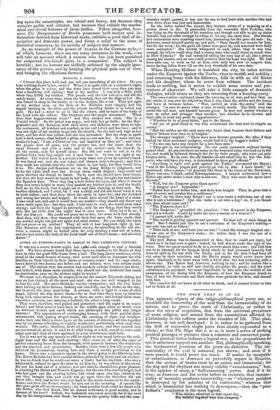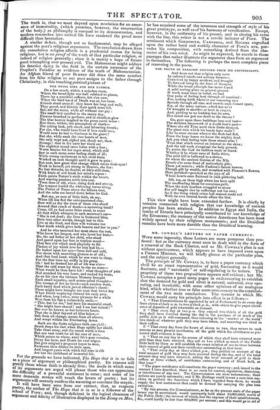THE HOPE THAT IS IN US.
THE apparent objects of this religio-philosophical poem are, to establish the immortality of the soul from the immateriality of its nature, and to prove the truth of Christianity, or rather to show the error of scepticism, first from the universal prevalence of some religion, and second from the consolations afforded by Christianity to the sufferer under the troubles of life. This plan, however, is not well developed : it is rather to be gathered from the drift of successive single parts than clearly expounded as a whole; so that The Hope that is in us is more a series of striking poetical passages or pictures than a coherent and connected poem. This poetical defect induces a logical one, as the propositions do not in strictness support one another. But, philosophically speaking, the fundamental positions of the poem are defective. The im- materiality of the soul is assumed, not shown ; and even if it were proved, it would prove too much. If matter be incapable of consciousness, as JOHNSON so powerfully argues in Basselas, then the animus of brutes must be an anima, and immaterial; for the dog and the elephant not merely exhibit " consciousness," but, in the opinion of many, a " half-reasoning " power. And if it be true, as JOHNSON and the writer before us maintain, that immate- riality of necessity produces immortality,—as "whatever perishes is destroyed by the solution of its contexture," whereas that which is immaterial has nothing to decompose,—then the "poor Indian's " conclusion is the most logical, " Who thinks, admitted to that equal sky,
His faithful dog shall bear him company."
The truth is, that we must depend upon revelation for an assur- ance of immortality, (which promises, however, the resurrection of the body,) as philosophy is unequal to its demonstration, and modern researches into animal life have rendered the proof more difficult than heretofore.
A similar defect, though not so fundamental, may be alleged against the poet's religious arguments. The conclusion drawn from the consolation religion affords is a prudential reason for being religious, but is no proof of the truth of that particular religion, or indeed of religion generally ; since it is merely a hope of future good triumphing over present evil. The Mahometan might adduce his fanatics dying in the field in the certain assurance of the Prophet's Paradise as evidence of the truth of Mahometanism. An Afghan friend of poor BURNES did draw the same comfort from his false religion as our poet assigns to the father through Christianity, in this touching poetical picture of THE DYING GIRL AND HER FATHER.
On a low couch, within a noiseless room, Where the broad light was half subdued to gloom, There lay a youthful sufferer, fair e'en now, When the hard hand of Death was on her brow.
Friends stood around : they knew her long and well;
They gazed, and bitterly their quick tears fell. Sad, sad the scene, while all without was gay :
The small bird carolled to the sunny day, Flowers breathed in perfume, and in cloudless glow The blue heaven laughed to the green earth below :
But there, within, the atmosphere of death—
The aching look, pale cheek, and labouring breath; For she, who would have lived if love could save, Would soon be lost to fondness in the grave!
But she, while sunk the iron hearts of men, She only wept not, sighed not, shook not, then.
Strange! that in life unto her timid ear The slightest sound came laden with a fear; Warm fancies fed her eager mind, which still Saw in each scene some boding shade of ill; While strong excitement in her vivid brain Worked on each thought until it grew to pain: But now, how great that change which meets their eyes! Weak in herself, yet strong in Heaven, she lies : No fear disturbs, no doubts, at life's still close, With hints of evil break her mind's repose : Faith quiets Nature's strife within the breast, And warring passions settle into rest. 'Tweet thus of old, when, rising dark and strong, The tempest hurled the whitening waves along, The Prince of Peace above the billows trod, And the calm sea bowed down before its God.
But say, ye men of little faith, oh say, When life has fled the unimpassioned clay, How will ye dry the tears of those who stand Around that couch of death—a sorrowing band? Cease, till ye find some fitter creed, to sneer At that which whispers in each mourner's ear- " She is not dead ; she lives in freshened bliss, Born into other worlds, though lost to this. Live as sbe lived, and thou wilt welcome too That death which gives both heaven and her to you."
And he who mourned her most above the rest,
Who knew her longest, and who loved her best,—
He, the sad father of her child, who stood
And gazed upon her face in tearless mood—
That face o'er which used playfully to flit
Flashes of joy which love for him had lit,—
He looked upon her eye—'twas dull and cold, Nor shone with answering glances as of old; And that fond hand, which he was wont to clasp, For the first time lay stiffly in his grasp.
Oh ! had he deemed her all of life was o'er— That the cold mass lay there to rise no more—
What would he then have felt ! what thoughts of pain Had scorched his very heart, and racked his brain, As on his view the torturer Memory brought
Each small injustice, each scarce-acted thought—
The wrongs of her he loved—each careless word, Each hasty deed which jarred affection's chord : These might have brought too soon that bitter day When Death unpitying claimed his early prey. And when, long hence, some pleasure for a while
Won from his lips a melancholy smile,—
"This, but for me," had been his mournful creed, " She might have shared ! and I am lost indeed !"
But now he knows, as but believers know,
That she is bleat beyond all bliss below,— Safe from all change, secure from all alarms, And wrapt within the Everlasting Arms.
Such are the fruits religious faith can yield : Death drops his dart when Hope uplifts her shield. Take these away, and the round world is then But one vast tomb for all the race of men, Which points to where, amid life's poor remains, Decay has been, and Death for ever reigns.
But give religion's pregnant hopes to man,
Existence then dilates its little span, And longest years with which full time is rife Are but the childhood of immortal life.
For the grounds we have indicated, The Hope that is in us fails as a piece of argument or philosophical poetry. Its reasons will gratify those whose faith is already firm; the mode in which some of its arguments are urged will please those who can appreciate the difficulty of a powerful statement in verse; and some of its more domestic scenes will touch the lovers of poetry ; but its arguments will scarcely confirm the wavering or convince the sceptic. It will have been seen from our extract, that, as respects poetry, the author of The Hope that is in us is a follower of the school of POPE; and, though deficient in the logical closeness of argument and felicity of illustration displayed in the Essay on Man, he has acquired some of the terseness and strength of style of his great prototype, as well as of his harmony of versification. Except, however, in the uniformity of his pauses, and in closing his verse with the line, this writer is not a servile imitator of POPE. The sentiment which GOLDSMITH, CAMPBELL, and ROGERS engrafted upon the rather hard and worldly character of Popes era, per- vades his composition, with something derived from the cha- racter of his own mind. As might be expected, he excels in those passages that rather illustrate the argument than form an argument in themselves. The following is perhaps the most complete piece of reasoning in the poem.
THE TRUTH OF RELIGION DEDUCED FROM ITS UNIVERSALITY.
And deem not that religion only rests
In cultured minds and solitary breasts—
Conceived by happy accident, and brought To forward being by the force of thought, While the broad principle has never found A solid resting.place on general ground. If truth must issue in belief, we find One pulse of feeling beat through all mankind : For, looking forth where'er our reasoning race Spreads through all time and crowds each distant space,
Say, of the many nations, which has ne'cr
Or wrought in sacrifice or bent in prayer, And, yielding to no lordship but its own, Has raised nor god nor devil to the throne ?
Go, gaze upon those buildings lone and vast— The skeleton framework of a world that's past—
Where sits old Time amid their limbs decayed, The giant ruin which his hands have made ! Like to some carcass whence the flesh had fled, From the huge bones we know the mighty dead. Ask you what feeling bade these stones arise ?
'Twas that which craved an interest in the skies ; And the tall work o'erspread the holy ground, To praise the God its builders made or found.
Whether it be where suns of India shine, The solid bill is hollowed to a shrine, Or where the ancient Genius of the Nile Broods o'er some front of melancholy pile;
These yet remain ; while Fashion's fairest bowers, Though gilt by wealth, and wreathed with Pleasure's flowers,
Have perished—perished as the joys of all Whose hearts once fluttered in each glittering hall.
Oft, too, on these high altars has been spilt The unoffending blood for conscious guilt, When the dark heathen struggled to atone For self-taught sins by sufferings not his own ; As if the thing which crime had stained could not With its own tainted hands efface the blot.
This view might have been extended further. It is chiefly by remains connected with religion that our knowledge of ancient
peoples has been attained. In addition to Egypt and India, the tombs of Etruria have principally contributed to our knowledge of
the Etruscans; the memory of the native Americans has been most widely spread by their religious monuments ; and the Druidical remains have been more durable than the Druidical learning.



























 Previous page
Previous page